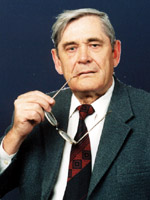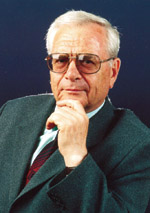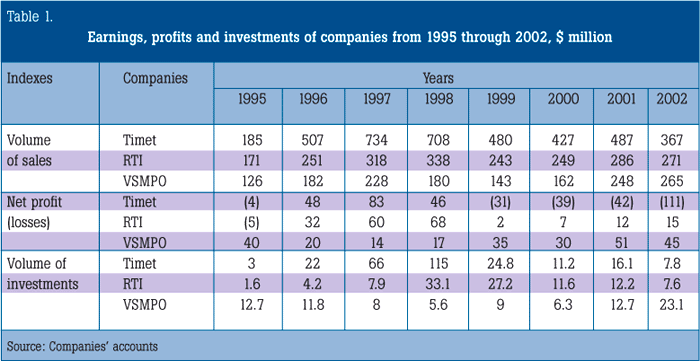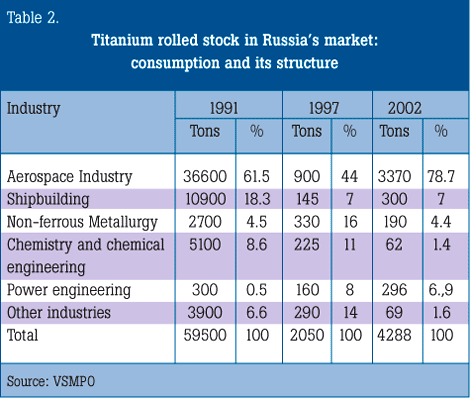Anatoly Stroshkov, Boris Postylyakov
VSMPO
he last decade in the 50-year long history of the world’s titanium industry has been remarkable for extreme situations caused by the direct dependence of the industry on the market of commercial aviation. With the fast growth of demand for trunk air liners in 1997 the titanium consumption in foreign markets reached its peak equaling 60,000 tons. Thanks to the high level of earnings leading companies in the titanium business received an opportunity to start an intense investment activity aimed at modernizing and expanding their stock of basic manufacturing equipment as well as acquiring additional productive capacities through the purchase of other companies’ shares. As a result, the trio of leading titanium corporations working predominantly for the aerospace industry was formed in the West: the Titanium Metals Corporation (Timet), RTI International Metals, Inc. (RTI) and Allegheny Technologies Incorporated (ATI). The latter bought the titanium-specialized companies Teledyne Wah Chang, Teledyne Allvac and Oremet. By combining their production potential with available capacities to make flat rolled stock of special steels it became one of the largest players in the world titanium market.

Anatoly Stroshkov, director for marketing and sales |
|
The period of upsurge in the Western titanium market coincided with the minimal demand for titanium in Russia and CIS member countries that in a few years fell from 60,000 tons down to between 1,800 and 2,000 tons a year. In this situation the management of the Verkhnyaya Salda Metallurgical Production Association (VSMPO) started making efforts to advance its titanium products to foreign markets. As Table 1 shows, opportunities were found at VSMPO to make annual investments in production amounting to $11 million to $12 million that were used for both diversifying production and upgrading engineering processes so as to meet requirements of Western customers. The export sales of titanium semi-finished products became the major source of VSMPO’s earnings. The enterprise managed to make a systematic investing of funds in building up production, perfecting engineering processes and improving the quality of its products. It gained the reputation of a reliable supplier of titanium ingots and rolled stock. The quality certificates for all principal processes and types of products were received from the world’s largest aircraft building companies, which are the main consumers of high-quality titanium rolled stock. VSMPO became a serious player in the world titanium market.
The economic crisis of 1998 in countries of Southeastern Asia ruined the market of long-distance aviation operations and caused a steep decline in demand for trunk passenger aircrafts. As an inevitable consequence of all these, the titanium industry was caught in a crisis situation as well. The revival of aviation operations, which began to take shape in 2001, was disrupted by events in New York on September 11 that year and later by the SARS epidemic.

Boris Postylyakov, manager for marketing and sales |
|
American producers of titanium rolled stock did not avoid negative consequences of the crisis. VSMPO has been getting through these difficult times with significantly less costs than its American competitors. One of the major stabilizing factors is the gradually renewing demand inside the country. In the last four years shipments of titanium rolled stock to the domestic Russian market have been on the rise annually. However, the structure of the country’s reviving titanium market is essentially different from the one that existed ten and even five years ago (Table 2).
The growth of supplies to the domestic market is taking place mainly because of the increased consumption of titanium by the aerospace industry that in the last five years expanded as much as 3.7 times. The major part of titanium rolled stock is used there to build military aircrafts, the export of which has been successfully ramping up lately. In 2002 alone there were shipments of about 40 SU-30 aircrafts under contracts with China and India. Last year the aircraft building industry manufactured several passenger air liners ordered by Russian and foreign air carriers. At long last, aircraft building enterprises are finishing up the reserves of titanium products left since the Soviet times and are switching over to the use of the fresh metal. Quite good prospects for producers of titanium rolled stock are connected with the impending renovation of the domestic fleet of civil and military aircrafts as well as engines for them.
In 2002 shipments of VSMPO’s products to customers in Russia and CIS member countries increased 1.5 times as compared with the level of 2001. Over 1,100 tons of bars and titanium-alloyed stampings out of 1,370 tons of the production increment were made for aerospace purposes.
Last year supplies of titanium rolled stock to Russia’s shipbuilding enterprises doubled against the level of 2001. They widely use titanium as a structural material with the high corrosion resistance. This trend reflects the start of the shipbuilding industry’s upturn. Under the state defense order there are plans to manufacture new strategic submarine missile carriers, to modernize the previously built multi-purpose nuclear submarines of the fourth generation as well as to continue the program of their construction. The share of shipbuilding products in the export arms sales program in 2002 rose up to 20 %.
 Russia’s power engineering industry is also increasing consumption of VSMPO’s titanium products. Titanium rolled stock is used there in gas turbine and gas-pumping installations, in gas-purification and dust-collection devices, in heat-exchange and condenser plants. From 2000 to 2002 Russian titanium welded pipes were used for the first time in heat-exchange systems of nuclear power plants in India. This remarkable fact provides VSMPO with opportunities of shipping large supplies of welded pipes for nuclear power plants that are being built and reconstructed in Russia and abroad.
By taking into account needs of consumers VSMPO is systematically increasing the volumes and range of its products while, at the same time, trying to reduce delivery dates. Its priority is to raise the share of high-quality products with the high degree of processing. To this end VSMPO is building up the volume of investments: in 2001 it grew up twice as much and in 2002 by 1.8 times. In 2003 investments in production will rise by 1.5 times more and will amount to $33 million.
|
|
VSMPO (Verkhnyaya Salda Metallurgical Production Association) is Russia’s leading maker of metal products for the aircraft building and space industries.
Has been in operation since 1933, when the country’s first enterprise was set up to make aluminum semi-finished products for building engines and aircrafts. During WWII was evacuated to the Urals. In the winter of 1941 and 1942 again started to produce metal ingots and rolled stock regardless of extreme conditions. In 1957 after reorganizing and developing a new technology VSMPO began manufacturing products from titanium alloys. In the 1970s and 1980s up to 75% of titanium products and almost 95% of aluminum-alloyed products were intended to meet needs of the aircraft-and-space complex. Semi-finished products of VSMPO were used in manufacturing such important components as the docking device of the Soyuz-Apollo space complex, the Buran space shuttle, the Energiya missile carrier, gigantic transport planes.
VSMPO’s main supplier of raw materials (titanium sponge) is AVISMA JSC. In 1998 the partners set up the production engineering corporation VSMPO-AVISMA that allows them to carry out a single engineering policy and marketing strategy.
|
| |
|
The major portion of investments goes to reconstruct and develop the forging production so as to improve the engineering process of manufacturing bar stock and structural stampings being supplied to aircraft and engine-building companies and enterprises. The production capacities to make titanium welded pipes will increase three times. There are preparatory works underway at the melting facilities for the start-up of a plasmarc furnace with cold bottom. This furnace will permit to make ingots of titanium alloys for the most important purposes as well as to raise the use of production waste in the furnace charge.
It should be recognized that Russia has a considerable potential for using titanium products. For example, it would be helpful to compare the distribution of the Russian titanium with the structure of titanium rolled stock in Japan. In order to meet requirements of power engineering in the county and abroad Japanese companies annually ship over 2,500 tons of titanium rolled stock and the volume of their shipments in 2002 even reached 3,200 tons. As for the Russian power engineering industry, in 2002 it acquired just 300 tons of titanium products. From 1,800 to 2,000 tons of the Japanese titanium rolled stock to manufacture plate-type heat exchangers have been shipped for a number of years. There are no production facilities to make such products in Russia so far. No less than 1,300 tons of titanium a year are used in Japan to manufacture consumer goods: watches, bracelets, spectacle frames, kitchenware, etc. With the growth of the middle class in Russia a considerable demand for such products is quite possible.
In order to develop the non-aircraft market in Russia the management of VSMPO together with potential customers is designing and testing items made of titanium. In this respect there are big hopes for setting up a joint venture Uniti with the company Allegheny Technologies Incorporated to make and market semi-finished products made of technically pure titanium. VSMPO regularly participates in the industry’s exhibitions, which are important in terms of the sales and advertisement. It also uses other forms of actively advancing its products toward consumers.

Stamping of bogie beam for A380 super-airbus. |
|
Under conditions that are existing in the world market VSMPO gives the priority importance to the following strategic directions:
– increasing the share of titanium in world production, mainly, by products of high processing: stampings, welded pipes, sheets; at the same time their export share in the production volume should be decreased down to 50 % so as to reduce the dependence on unstable conditions in foreign markets;
– fully meeting the needs for titanium rolled stock by enterprises in Russia and CIS member countries, maintaining the quality level of these products in accordance with requirements of international standards;
– further diversifying production along with starting to manufacture engineering products: heat-exchanging, chemical and power-engineering equipment on the basis on titanium alloys;
– developing production of aluminum alloys, starting to make semi-finished products of high-strong steels and nickel alloys, consumer goods.
In July 2003 the Verkhnyaya Salda Metallurgical Production Association marked its 70th anniversary. It should be stressed that the enterprise is retaining the leading position in the world’s titanium industry. VSMPO possesses a sufficient personnel, scientific and engineering as well as production potential so as to build up supplies of high-quality products for Russian and foreign consumers. 
|






 back
back







